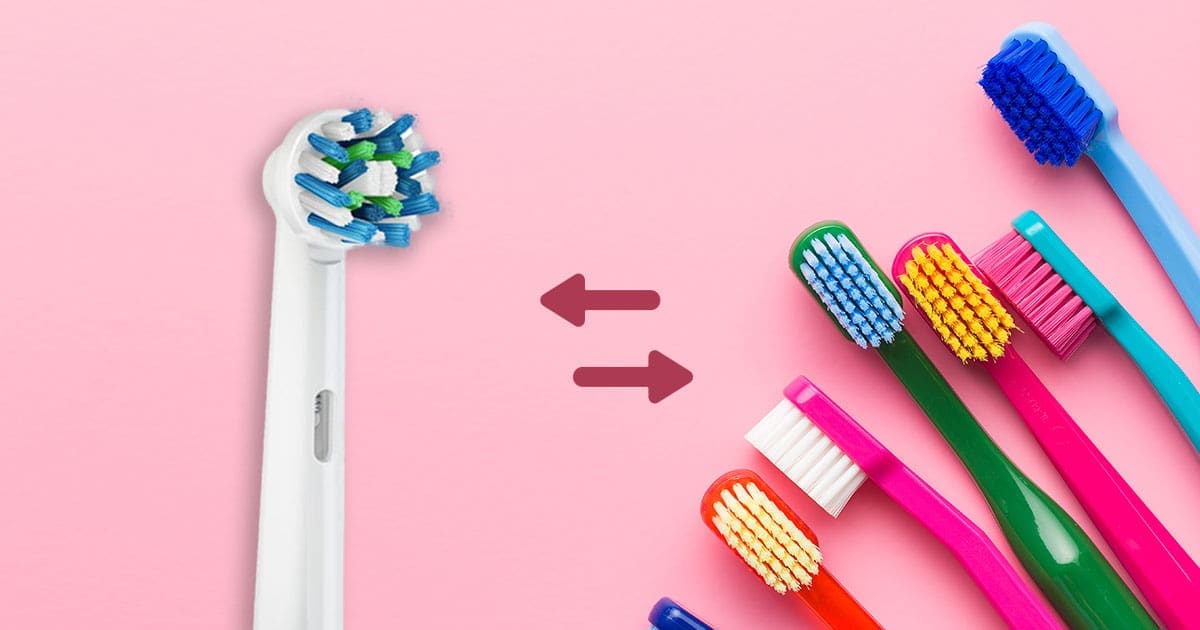
The effectiveness of cleaning your teeth with a manual toothbrush compared to an electric toothbrush is commonly debated today. There’s an assumption that the modern day electric replacement is far superior to the good old-fashioned manual toothbrush.[1]
The reality is that it’s essential to brush your teeth – and whether you’re using a manual toothbrush or an electric option, the important factor is completing a thorough, two-minute brush at least once every day. So whatever toothbrush you choose to use isn’t important because it’s the brushing itself that counts.
In saying this, there are some pros and cons to consider when making the decision to use a manual or electronic toothbrush. Here’s a rundown of how different toothbrush types can enhance your dental routine:
The humble manual toothbrush: More for less!
- Manual toothbrushes will thoroughly clean your tongue and inside cheeks when you’re doing your two minute routine brush. The circular headed electric toothbrushes perform poorly at cleaning your tongue. However, some do come with tongue cleaners.
- Manual toothbrushes are more flexible. Unlike electric toothbrushes with tightly compacted bristles, manual toothbrushes are so easy to manoeuvre around your mouth. Their flexible bristles can bend back far enough to reach those stubborn teeth at the back hiding food.
- They’re easy to travel with. How many times have you travelled with an electric toothbrush thinking it was fully charged, but it was actually dead? And without a charger, you had to rely on using the complimentary hotel toothbrush – or even had to run to the corner store where you ended up buying a cheap manual toothbrush anyway.
- Manual toothbrushes come in a much larger variety. They’re available in soft, medium and hard bristles with a small, standard or larger head. Now if you’re an adult with a tiny mouth, you’re going to need a lot of luck finding a small head on an electric toothbrush that doesn’t have Disney prints all over it.
The electric toothbrush: Quality benefits!
- Advanced electric toothbrushes include an automatic timer in their design, which makes it easier for users to know when their two minute brush is complete. This ensures a proper clean is achieved to maintain oral hygiene.
- You get what you pay for. While the popularity surrounding electric toothbrushes have made them readily available, dentists recommend that you spend money to get a quality product.
- An electric toothbrush is very ideal for people who suffer from arthritis[2], carpal tunnel syndrome and any other painful or movement-restricting conditions. Since the electric toothbrush’s rotating head does all the work, the user is exempt from constantly applying effort with their wrists and hands; making dental care a much easier task.
References
P.W. Read et al. 1981. “Dental Study in Patients with Rheumatoid Arthritis”, Rheumatology 20(2), 108-112.
K. Stolze, L. Bay. 1994. “Comparison Of A Manual And A New Electric Toothbrush For Controlling Plaque And Gingivitis”, Journal of Clinical Periodontology 21 (2), 86-90
[1] K. Stolze, L. Bay, “Comparison of a Manual and a New Electric Toothbrush for Controlling Plaque and Gingivitis”, Journal of Clinical Periodontology 21, no. 2, (1994): 88
[2] P.W. Read et al., “Dental Study in Patients with Rheumatoid Arthritis”, Rheumatology 20, no. 2 (1981): 110

